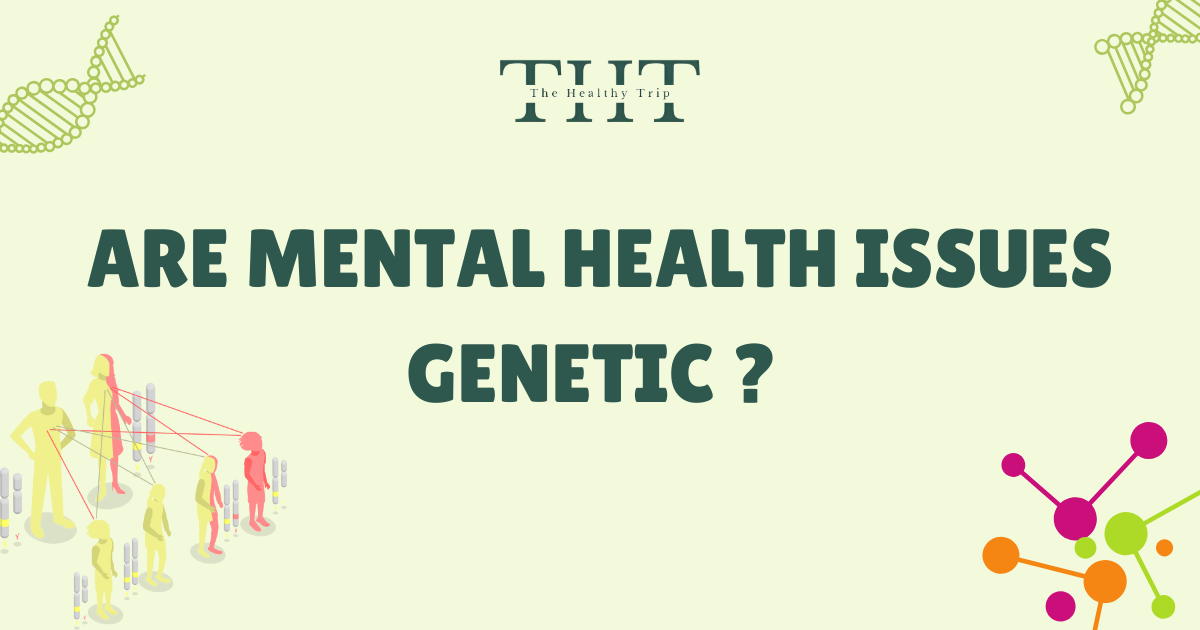Mental health is a function of an interaction of multiple factors worldwide and according to research, genetics take a big part of an individual mental health destiny. In this blog, the author looks at the concept of genetic factors that determine mental health, the genetics of common mental disorders, and how other factors can affect mental health.
Understanding Mental Health and Genetics
The factors that are genetic having to do with mental health are passed through the genes and may lead to depression or anxiety disorders, bipolar disorder or schizophrenia. These genes do increase the probability of one developing a mental health issue but they don’t mean that a person is going to definitely develop one. They do not operate in isolation but in symbiosis with factors such as lifestyle, trauma, stress and the environment to give a complex picture of risk with regard to mental health.
Common Mental Health Conditions and Their Genetic Links
In general, specific mental health conditions can be inherited, which means they are caused by genes. Below are some common mental health conditions and what research says about their genetic links:
1. Depression
Genetic Factors: According to scientific research, there is about 40-50% chance that a person develops depression through heredity. Some of the genes that have been found to cause depressions include those corresponding to serotonin and dopamine, two emotions regulating chemicals.
Environmental Influence: There it became clear that life stressors, trauma and other sorts of external stimuli are essential for triggering or aggravating depression even in genetically predisposed individuals.
2. Anxiety Disorders
Genetic Factors: While GAD and other forms of anxiety are believed to have genetic components, those components are still about 30-40%.
Environmental Influence: Stress, lifestyle and personality derived different feelings in persons with susceptible genes can cause anxiety.
3. Bipolar Disorder
Genetic Factors: Bipolar disorder is related to genetic factors, and the research reveals that the illness is 60-80% heritable.
Environmental Influence: Risk factors include extremes of stress, use of drugs, alcohol and sleep factors in determining when and how severe the symptoms become.
4. Schizophrenia
Genetic Factors: Schizophrenia is currently considered to be one of the most heritable mental disorders with the heritability coefficient of 80 percent.
Environmental Influence: Hence while it is highly genetic, she acknowledges that environmental stressors, living in cities and substance use are also responsible for the condition.
5. ADHD – Attention Deficit Hyperactivity Disorder
Genetic Factors: Studies reveal that approximatley 74% of ADHD is attributed to genes.
Environmental Influence: Early childhood exposure to carcinogenic substance, premature birth, and stress during pregnancy can be considered as some of the causes of the disease.
How Genes Influence Mental Health
1. The Role of Neurotransmitters
- The genes also affect the mechanisms which control the levels of serotonin, dopamine and norepinephrine – responsible for mood, motivation and cognition respectively.
- It affects mental illness because any form of variability to the genes will lead to an imbalance in the brain chemistry.
2. Epigenetics and Mental Health
- Epigenetics examines how the genes are regulated by organizational structures apart from changing the physical code.
- Genes connected with mental health can be influenced by these factors including: lifestyle choices, trauma, diet and stress levels.
3. The Polygenic Nature of Mental Illness
- Mental Illness is a Group of Diseases that are Polygenic in Nature Most mental health problems are said to be polygenic; that is, they are controlled by two or more genes.
- This polygenic influence further goes on to make it difficult to talk of an origin pulling from a single factor hence the need to think of mental health as a complex issue.
Nature vs Nurture: Environmental Impact on Mental Health
While genetics play a role, environmental factors like upbringing, social support, and personal experiences also significantly influence mental health:
- Trauma and Stress: Abused children, high pressure work place, poor childhood may lead to personality disorder and mental health problems.
- Lifestyle: Diseases and disorders may be inherited since genes are passed from parents to children, but genetic tendencies are either magnified or minimized based on individual habits, including inadequate exercise, poor diet, and unpredicted rest patterns.
- Social Environment: It has been demonstrated that positive family and friends appear to moderate genetic risk and foster general well-being in regard to mental health.
Identifying and Managing Genetic Risks
Being aware that some mental health disorders can be inherited enables individuals make constructive decisions on their health. Here are some proactive steps to manage genetic risks:
1. Awareness and Education
- Patient knowledge about his or her family is important in identifying genetic endangerments.
- When patients first develop the symptoms or signs of a medical condition, they can benefit from an early treatment plan.
2. Therapy and Counseling
- Talk therapy is possible in the form of CBT or psychotherapy and helps to offer the person coping mechanisms, as well as emotional support.
- Family therapy is useful, especially in case an individual (or both partners) has certain genetic predispositions identified in their family history.
3. Healthy Lifestyle Choices
- Normal exercise, proper diet and normal sleep play vital role in the mental health of a person.
- The study also shows that engaged mindfulness practices such as meditation and deep breathing help lower stress and lesson genetic reactivity.
4. Seeking Professional Help
- Genetic counselling is more of an education of the genetic hazards, and possible measures towards avoiding them.
- It is because psychiatrists and psychologists are capable of making the right adjustments to cater for genetic and environmental conditions.
How to Support Mental Health in Everyday Life
- Prioritize Self-Care: Daily exercise or engaging in a hobby, or even taking time off to either meditate or engage in any stress reducing activity is very healthy for the mind.
- Stay Socially Connected: These involve social connections that offer people assurance, and consequently protecting them from vulnerability arising from genes.
- Engage in Mental Health Screenings: It implies that when everybody goes for normal check-ups of their mental health once in a while, any sign of complication is detected early enough.
Conclusion
Though mental health disorders have a great genetic component, they are not destiny makers. The easily observable factors are by no means less influential on mental health as genetic, biochemical and other factors that might be the focus of attention for scientific research. In this manner the genetic part of mental health can be controlled and prevented so people can have better and healthier lives.










